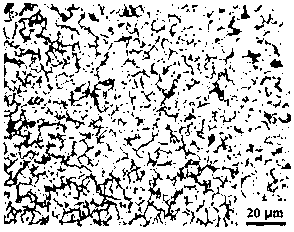A method and system for predicting lamellar tear resistance of steel used in high-rise buildings
A technology of anti-lamellar tearing and performance prediction, applied in special data processing applications, instruments, electrical digital data processing, etc., to achieve the effect of friendly interface, easy operation and excellent universality
- Summary
- Abstract
- Description
- Claims
- Application Information
AI Technical Summary
Problems solved by technology
Method used
Image
Examples
Embodiment 1
[0057] Taking Q420EZ35 steel for high-rise buildings with a plate thickness of 80mm as an example, the process flow is: hot metal pre-desulfurization→converter smelting→LF refining→RH vacuum degassing→continuous casting on the continuous casting machine (the thickness of the continuous casting slab is 320mm), mainly hot rolling The process parameters are as follows: starting rolling temperature 1050-1150°C, finishing rolling temperature 830-890°C, crimping temperature 510-590°C, continuous casting speed = 0.65m / min, light reduction rate = 1.13mm / m.
[0058] Using MATLAB software to map the relationship between the existing rolling process parameters and lamellar tear resistance ( i = 1, 2, 3, j = 0, 1, 2, ..., k) for PLS calculation, the algorithm steps are as follows.
[0059] Step 1: Relevant process data of rolled samples (≥9), as shown in Table 1.
[0060] Table 1 Sample process parameters and test results
[0061]
[0062] Step 2: Investigate the issue of multiple c...
Embodiment 2
[0084] In order to fully illustrate the universality of the prediction method and system, take Q420D with a plate thickness of 40mm as an example. The process flow is: hot metal pre-desulfurization→converter smelting→LF refining→RH vacuum degassing→continuous casting on No. 3 continuous casting machine (Thickness of continuous casting slab is 220mm), the main process parameters are: starting rolling temperature 980~1080℃, final rolling temperature 830~870℃, crimping temperature 470~550℃, continuous casting speed=1.1m / min, light reduction rate = 1.11 mm / m. The modeling and optimization process and steps are the same as in Example 1.
[0085] Step 1: Relevant process data of rolled samples (≥9), as shown in Table 5.
[0086] Table 5 Sample process parameters and test results
[0087]
[0088] After step 2~step 4 described in embodiment 1, obtain the PLS prediction model of anti-lamellar tearing performance, Q420D high-rise building steel anti-lamellar tearing performance Ψ ...
Embodiment 3
[0096] Taking Q420GJEZ35 with a plate thickness of 60mm as an example, the process flow is: pre-desulfurization of molten iron→converter smelting→LF refining→RH vacuum degassing→continuous casting on No. 3 continuous casting machine (the thickness of the continuous casting slab is 220mm), the main process parameters are : Start rolling temperature 1030-1080°C, finish rolling temperature 840-880°C, coiling temperature 500-550°C, continuous casting speed = 1.1m / min, light reduction rate = 1.11mm / m. The modeling and optimization process and steps are the same as in Example 1.
[0097] Step 1: Relevant process data of rolled samples (≥9), as shown in Table 7.
[0098] Table 7 Sample process parameters and test results
[0099]
[0100] After step 2~step 4 described in embodiment 1, obtain the PLS predictive model of anti-lamellar tearing performance, Q420GJEZ355 high-rise building steel anti-lamellar tearing performance Ψ Z for:
[0101] Ψ Z =0.0211x 1 +0.0901x 2 +0.0697x...
PUM
| Property | Measurement | Unit |
|---|---|---|
| particle size | aaaaa | aaaaa |
| particle size | aaaaa | aaaaa |
| particle size | aaaaa | aaaaa |
Abstract
Description
Claims
Application Information
 Login to View More
Login to View More - R&D
- Intellectual Property
- Life Sciences
- Materials
- Tech Scout
- Unparalleled Data Quality
- Higher Quality Content
- 60% Fewer Hallucinations
Browse by: Latest US Patents, China's latest patents, Technical Efficacy Thesaurus, Application Domain, Technology Topic, Popular Technical Reports.
© 2025 PatSnap. All rights reserved.Legal|Privacy policy|Modern Slavery Act Transparency Statement|Sitemap|About US| Contact US: help@patsnap.com



